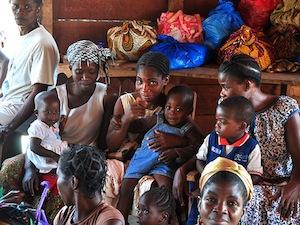Untangling the conflict in the Ivory Coast
Image of displaced people in the Ivory Coast (Image by Flickr user Sunset Parkerpix (cc:by-sa))
This story was originally covered by PRI’s The Takeaway. For more, listen to the audio above.
There are still reports of gunfire in Ivory Coast’s main city of Abidjan, as fighters loyal to internationally-recognized President Alassane Ouattara continue their quest to force the incumbent Laurent Gbagbo to step aside. The BBC’s John James told PRI’s The Takeaway, “It’s a confusing picture at the moment.”
Over the last few months, Gbagbo has refused all offers to surrender, James reports, “including one from Barack Obama for him to come to the United States to retire there with a professorship to a university.”
The situation has now changed dramatically since the United Nations and France have attacked targets in the country. James told The Takeaway that Gbagbo is now “sort of backed in a corner.”
“I think what the international forces did was made an operational decision to tip the scale in favor of the internationally recognized winner of the election,” Peter Pham, director of the Michael S. Ansaari Africa Center at the Atlantic Council in Washington, told The Takeaway. Pham says that the world is “facing a potential humanitarian emergency if the two sides fought it out in a street-by-street battle for the capital,” and the UN intervention was an attempt to avoid that.
The opposition has said they don’t want Gbagbo harmed in the offensive, because they intend to bring charges against him in the international criminal court, James told The Takeaway. “There have been several hundred killed over the last four months or so, and over Laurent Gbagbo’s 10 years in charge also numerous other reports of human rights atrocities.” Some hope he will stand trial for those crimes.
At the same time, Pham stresses that “justice also needs to be even handed.” He points to reports saying that “the pro-Ouattara forces — the forces that are bringing President Ouattara to power — engaged in atrocities just in the last week alone, to say nothing of during the civil war.”
Ouattara is not only the internationally recognized winner of the recent election, he’s also a Western-educated economist. But to come to power, Pham says “he made a deal with the devil, so to speak, in the form of rebels from the north, giving them legitimacy to invade the south, something they hadn’t been able to do during the civil war. And it’s quite clear they took it out on the civilian population.”
One of the big questions that remains, according to Pham, is “having ridden to power on their back, how independent he can be from [the rebels] and their leader, whom he has appointed the Prime Minister of his government.”
————————————————————–
“The Takeaway” is a national morning news program, delivering the news and analysis you need to catch up, start your day, and prepare for what’s ahead. The show is a co-production of WNYC and PRI, in editorial collaboration with the BBC, The New York Times Radio, and WGBH.
